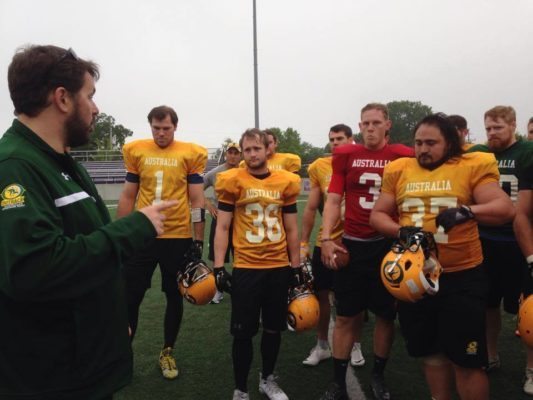IFAF World Championships: Australia’s Team Outback Getting Ready for Opener Against Korea

At 8:01 am, Head Coach John Leijten made a challenge to his squad which required a physical and mental response.
By 10:23am, he had his answer.
And he liked it.
Following a tough opening three days of the Australian Outback’s training camp ahead of the IFAF World Championships, the coaching staff decided to give the players the opportunity to earn some extra recovery time on day four. The challenge was simple; give everything and have one session, or conserve energy and have two sessions.
“Everyone stepped up,” Defensive Back Scott Wolfe said following practice. “We had more plays installed, it’s tough but we all need the rest. We’re not working for the rest though, we’re working to get better and do well.”
Leijten clearly got his answer from the increased effort on the field. In the additional spare time, players took advantage of the ice bath and pool facilities in order to help reduce fatigue and speed up rehabilitation.
“They took it for what it was; it was a challenge and they picked it up again which is good,” Leijten said. “They were more focussed with a little bit more speed and tempo.”
Tempo has indeed been the buzz word over the duration of the camp so far, with all of the coaches very pleased with the pace and intensity being applied to the sessions. However, it’s the issue of maintaining an alternate balance of health alongside of it which has been a slight concern.
“I think everyone’s a bit battered and bruised, but I think they really want this more than anything. So everyone’s just pushing and fighting through it all,” Defensive Lineman James Pritchard said.
Overall, the camp so far has been a success on many levels. Whilst all logistical plans surrounding host campus Ashland University have been going smoothly, the play on the field in training has also been solid.
Following a singular training session on the opening day, double sessions on the following days have seen plenty of progression in conjunction with removing the rust from the players and their respective units. The coaches have highlighted the increased sharpness in execution in particular.
“We’re constantly improving, which is obviously what you want. It’s also what we always see; it’s always that when they come into camp, the rust needs to be knocked off. They need to get re-acquainted with the scheme and all that kind of stuff; they’ve been steadily improving,” Leijten said.
With a solid amount of practice in the books, the overall ability of the team is starting to become as clear as ever. Offensive Lineman James Gifford was a member of the 2011 squad that travelled to Austria for the previous IFAF World Championships, and sees some similarities and improvements in comparison.
“You could compare it to the 2011 team. I think we’ve got, as a whole, probably a stronger squad than last time; we’re a bit deeper in a lot of positions which is good. The intensity has been there since Day 1,” Gifford said.
The squad is now almost halfway through its training schedule; the team will move into the international village at Walsh University on July 8th just prior to their opening clash against South Korea. It’s become clear now that with time running out for preparation, the Australians have plenty to be wary of.
Photos: Elissa Manera

